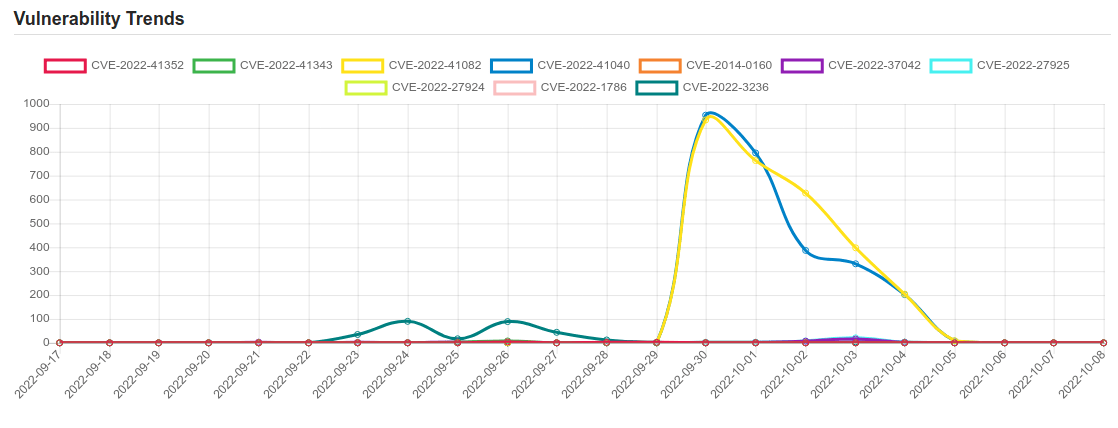Daily Vulnerability Trends: Sun Oct 09 2022

| CVE NAME | CVE Description |
| CVE-2014-0160 | The (1) TLS and (2) DTLS implementations in OpenSSL 1.0.1 before 1.0.1g do not properly handle Heartbeat Extension packets, which allows remote attackers to obtain sensitive information from process memory via crafted packets that trigger a buffer over-read, as demonstrated by reading private keys, related to d1_both.c and t1_lib.c, aka the Heartbleed bug. CVSS V2 scoring evaluates the impact of the vulnerability on the host where the vulnerability is located. When evaluating the impact of this vulnerability to your organization, take into account the nature of the data that is being protected and act according to your organization’s risk acceptance. While CVE-2014-0160 does not allow unrestricted access to memory on the targeted host, a successful exploit does leak information from memory locations which have the potential to contain particularly sensitive information, e.g., cryptographic keys and passwords. Theft of this information could enable other attacks on the information system, the impact of which would depend on the sensitivity of the data and functions of that system. |
| CVE-2022-37042 | Zimbra Collaboration Suite (ZCS) 8.8.15 and 9.0 has mboximport functionality that receives a ZIP archive and extracts files from it. By bypassing authentication (i.e., not having an authtoken), an attacker can upload arbitrary files to the system, leading to directory traversal and remote code execution. NOTE: this issue exists because of an incomplete fix for CVE-2022-27925. |
| CVE-2022-27925 | Zimbra Collaboration (aka ZCS) 8.8.15 and 9.0 has mboximport functionality that receives a ZIP archive and extracts files from it. An authenticated user with administrator rights has the ability to upload arbitrary files to the system, leading to directory traversal. |
| CVE-2022-27924 | Zimbra Collaboration (aka ZCS) 8.8.15 and 9.0 allows an unauthenticated attacker to inject arbitrary memcache commands into a targeted instance. These memcache commands becomes unescaped, causing an overwrite of arbitrary cached entries. |
| CVE-2015-1194 | pax 1:20140703 allows remote attackers to write to arbitrary files via a symlink attack in an archive. |
| CVE-2022-1786 | A use-after-free flaw was found in the Linux kernel’s io_uring subsystem in the way a user sets up a ring with IORING_SETUP_IOPOLL with more than one task completing submissions on this ring. This flaw allows a local user to crash or escalate their privileges on the system. |
| CVE-2022-3236 | A code injection vulnerability in the User Portal and Webadmin allows a remote attacker to execute code in Sophos Firewall version v19.0 MR1 and older. |
| CVE-2022-20409 | No description provided |
| CVE-2022-31680 | No description provided |
| CVE-2022-25748 | No description provided |
| CVE-2022-35914 | /vendor/htmlawed/htmlawed/htmLawedTest.php in the htmlawed module for GLPI through 10.0.2 allows PHP code injection. |
| CVE-2019-3582 | Privilege Escalation vulnerability in Microsoft Windows client in McAfee Endpoint Security (ENS) 10.6.1 and earlier allows local users to gain elevated privileges via a specific set of circumstances. |
| CVE-2022-40833 | No description provided |
| CVE-2022-41852 | No description provided |
| CVE-2021-44228 | Apache Log4j2 2.0-beta9 through 2.15.0 (excluding security releases 2.12.2, 2.12.3, and 2.3.1) JNDI features used in configuration, log messages, and parameters do not protect against attacker controlled LDAP and other JNDI related endpoints. An attacker who can control log messages or log message parameters can execute arbitrary code loaded from LDAP servers when message lookup substitution is enabled. From log4j 2.15.0, this behavior has been disabled by default. From version 2.16.0 (along with 2.12.2, 2.12.3, and 2.3.1), this functionality has been completely removed. Note that this vulnerability is specific to log4j-core and does not affect log4net, log4cxx, or other Apache Logging Services projects. |
| CVE-2022-41352 | An issue was discovered in Zimbra Collaboration (ZCS) 8.8.15 and 9.0. An attacker can upload arbitrary files through amavisd via a cpio loophole (extraction to /opt/zimbra/jetty/webapps/zimbra/public) that can lead to incorrect access to any other user accounts. Zimbra recommends pax over cpio. Also, pax is in the prerequisites of Zimbra on Ubuntu; however, pax is no longer part of a default Red Hat installation after RHEL 6 (or CentOS 6). Once pax is installed, amavisd automatically prefers it over cpio. |
| CVE-2022-41343 | registerFont in FontMetrics.php in Dompdf before 2.0.1 allows remote file inclusion because a URI validation failure does not halt font registration, as demonstrated by a @font-face rule. |
| CVE-2022-41082 | No description provided |
| CVE-2022-41040 | No description provided |
| CVE-2022-40684 | Fortinet FortiOS and Fortinet FortiProxy security bypass | CVE-2022-40684 |
A considerable amount of time and effort goes into maintaining this website, creating backend automation and creating new features and content for you to make actionable intelligence decisions. Everyone that supports the site helps enable new functionality.
If you like the site, please support us on Patreon using the button below

To keep up to date follow us on the below channels.




![Cobalt Strike Beacon Detected - 49[.]233[.]32[.]31:9443 6 Cobalt-Strike](https://www.redpacketsecurity.com/wp-content/uploads/2021/11/Cobalt-Strike-300x201.jpg)
